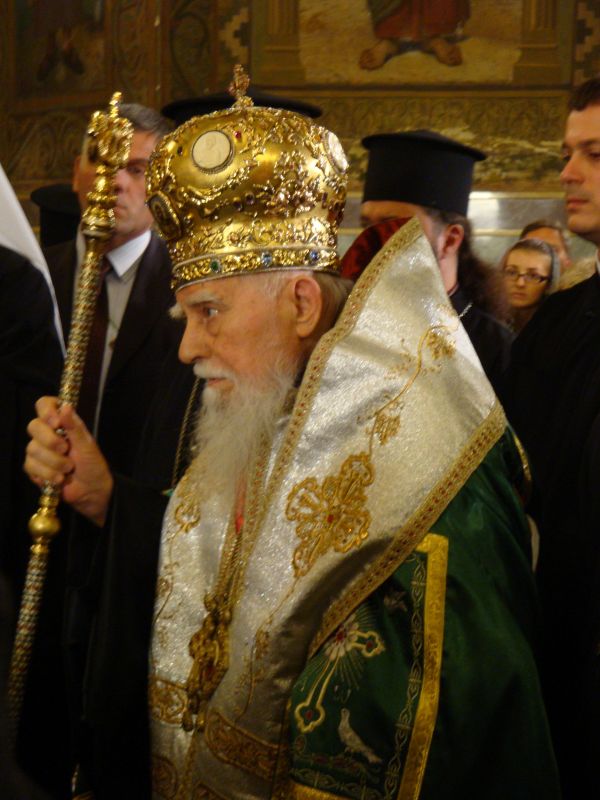
Head of our Bulgarian Orthodox Church, his all holiness Patriach Maxim passed away to Christ early this morning 06 November 2012 around 03:30 а.m.
Our beloved patriarch headed the Bulgarian Orthodox Church in truth for the immersely high 41 years! Patarirch Max was the oldest among all Orthoodox Christian patriarchs. Just 8 days earlier, we have celebrated in the Church his 98 birthday.
People who know the patriarch personally, said from his youth even even to his old years he used to be "The same humble person".
Our patriarch birthname "in the world" was Marin Naydenov Minkov and Pena Bordjukova. The patriarch was born from a father Nayden Minkov Rachev. Almost none is known about how the future Bulgarian Church patriarch who headed the Church ( 1971 – 2012 ) lived in his young years, similarly little is known about his family (parents) background, all we know is his parents was very pious people.
His Holiness Patriarch Maxim was born in Oreshak a little village near the city of Lovech, Bulgaria. His education was given in his native birth place – the mountain village of Oreshak.
In year 1935 His Holiness completed Sofia's Spiritual Seminary School ( Sofiiska Duhovna Seminaria ). In 1942 his holiness completed a Theological Degree in Sofia State University – saint Clement of Ohrid ( Saint Kliment Ohridski ).
Patriarch Maxim (become monk) in his early years in 27 years old, after the usual period for testing novice monks (2 to 5 years) in Trojan's Monastery (Troianski Manastir), this means his holiness become novice monk in the very young age of 21 or 22 years. He was ordained to monk receiving the monk name of Maxim on 13 of December 1941 under the Church degree of Hierodeacon.
A small note to make here for those unfamiliar with Orthodoxy is in Orthodox Church it is accepted that once a person is ordained to be a Monk or Priest (part of white or black brotherhood), he is usually given a name of a Church saint.
His holiness was given the monk name of Maxim after one of the greatest Christian saints of all times Maxim the Confessor . Saint Maxim (The Confessor) was martyred for Christ in nowadays Bulgaria lands.
After a while, he was for a short time he served as a Hierodeacon to Lovchanski's Metropolitan (Metropolit of Lovech) and in year 1942, his holiness was assigned as a Theology Teacher in Sofia's Spiritual seminary ( Sofiiska Duhovna Seminaria ), he served as a Christian Theology teacher for about 5 years from y. 1942 to 1947.
In 14 May 1944 from HieroDeacon he was consecrated to be Hieromonk, 3 years later in 1947, he was raised to Archimandrite and assigned as Protosingel of Dorostolsko – Chervenska Eparchy ( Dorstol's Eparchy ) by Mitrpolitan Mihail (Michael).
By decision of the Bulgarian Orthodox Church Holy Synod, Archimandrite Maxim was send to serve as a rector for Bulgarian Christian community in Moscow, his ministry in Moscow lasted almost 6 years from 1950 to 1955.
Archibishop Maxim came back to Bulgaria in 1955 and was assigned as a Head Secretary for the Bulgarian Orthodox Church Holy Synod. As a primary secretary of Bulgarian Church Holy Synod he served in year 1955 to 1960. Along with his duties are primary secretary of Holy Synod in 1957 to 1960, he was serving as a Chairman of the Editorial Board of the Synodal periodical spiritual literature print.
In 30 December 1956, he was hierotonize ( ordained ) as Bishop Branitskogo (Branitski) – this happened after proposed by his all holiness patriarch Cyril and decided on one of the regular Holy Synod of Bulgarian Orthodox Church meetings.
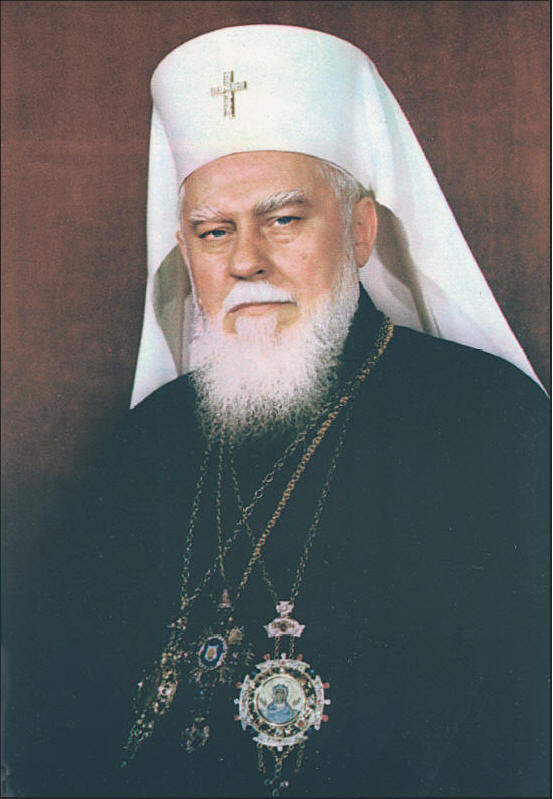
30 of October his holiness was assigned to serve as Metropolitan Lovchanski ( Metropolit of Lovchanski Church region ).

After the passing to Christ of our previous Bulgarian Church patriarch, his holiness patriarch Cyril (Kirilos), in the following in the Patriarchate Church (national) assembly of BOC (Bulgarian Orthodox Church) 4 -8 July 1971 in Sofia, Metropolitan Lovchanski Maxim was canonically chosen to be vicar of the BOC Holy Synod.
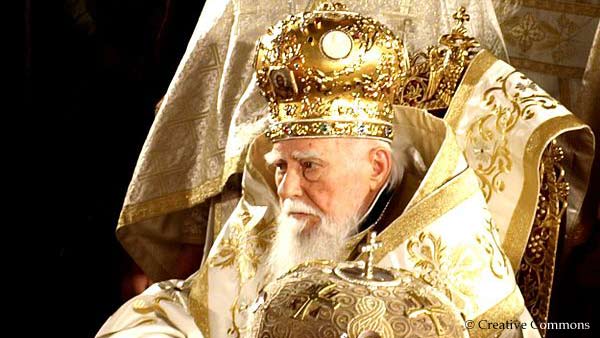
His entronization as new patriarch took place on 4 July 1971 in Alexander-Nevski's ( Bulgarian Holy Synod ) council. Patriarch Maxim became the 21-st ( Primate ) Patriarch of the Bulgarian Orthodox.
According to Bulgarian Church internal law, the patriarch of Bulgaria is also a Metropolitan of Sofia.

Little after he was chosen the Patriarch of all Russia at that time Pimen, in his speech spoke of the recently chosen Bulgarian patriarch as a prominent hierarch with many virtues.
In November y. 1974 the Assembly of Sofia's Spiritual Academy awarded His All holiness Patriarch Maxim of Bulgaria for his great theological contributions Phd scientific rank ( honoris causa ).
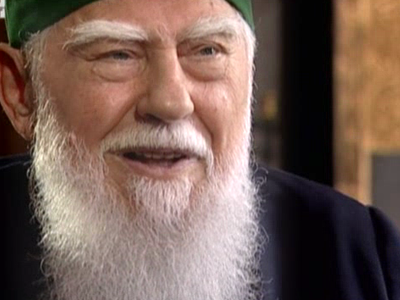
To celebrate his 60th anniversary BOC Synodal Publishing of Sofia issued a collection of his works entitled "In the field of the Lord" (Sofia publishing 1975). The book includes words, speeches and articles of Patriarch Maxim for period 1950 – 1974.
In 1974, the Council of the Sofia Theological Academy awarded Patriarch Maxim for his theological writings a degree of Doctor of Theology honoris causa. 60th Anniversary of Patriarch Maxim Synodal Publishing in Sofia issued a collection of the works of his work "In the field of the Lord" (Sofia, 1975). The book includes the words, speeches and articles for 1950-1974 Patriarch Maxim's.
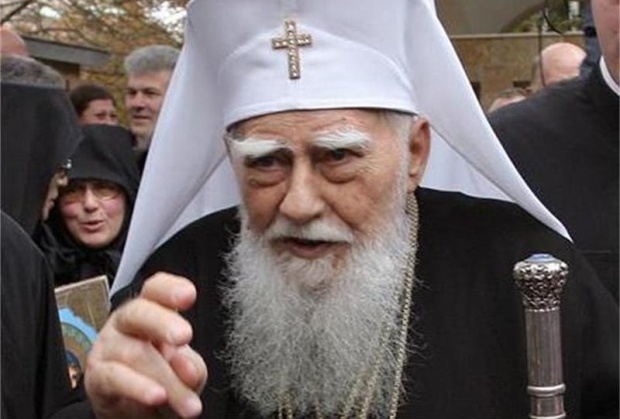
Last year the newly chosen Patriarch of all Russia, Cyril met our Patriarch Maxim.
Over the last years the patriarch has suffered severely with Diabetes and had a health complications, "being powerful in his infirmities", just like Holy apostle saint Paul. Patriarch Maxim leaded the Bulgarian Orthodox church wisely preventing the Church from complete disintegration and managing to keep the Church existent even though the severe attempts of Communist authorities to destroy the Church. His long given rulership over the Church is something very rare in whole Church history since Christ and in my view can be considered indicator that his holiness patriarch Maxim was pleasing to God in his service.
The funeral of Patriarch is to be served in Troyanski Manastir (Trojan Monastery), in the Church Dormition of the Holy Theotokos behind miracle making icon of the Virgin Mary on Friday 9th of November 2012. By God's providence and the Holy Synod of BOC decision, his body will be laid in the same monastery, where he was ordained as monk. The funeral preparations will be made by the Abbot of Troyanski Monastery Branitski / Bishop Grigorius (Grigorij).
The Bulgarian Government announced Friday to be a day of sorrow in memoriam of patriarch Maxim. Along in the whole Bulgarian country Churches Za Upokojna slubja (A service prayer for the newly introduced patriarch in the Lord ) were served yesterday and will be continuously served in the next 3 days.
Now what is left is we pray for our patriarch's soul and by patriarch Maxim's prayers the Lord Jesus Christ to bless our Bulgarian Orthodox Church with another good and wise patriarch.








Baby boomers and Generation X, Y, Z – Generational Marketing and 4 Common personality stereotype traits of people born over the last 60 years
Saturday, August 18th, 2018Those who are employed in the realm of Social or Internet Marketing definitely have to know the existence of at least 4 different conditional stereotypes, these are Baby Boomers and Generation X, Generation Y and Generation Z (Millenials).
According to Socielogist Karl Mannheim (who is among the founding fathers of classical socielogy) – "All members of a generation share a similar collective experience" or in other words people are categorized in generations depending on when they were born.
As stereotypes they're generalization of people born in different periods of time and sharing same or similar traits.
Because of the age and the conditions they grew up and as they share those general spirit of time and age, they tend to be more or less behaving in a similar ways in how they think save / spend money or share some common approach to life choices and attitude towards life and worldview.
But before proceeding to the 4 main cohert provisional stereotypes, its worthy to mention how these four common trait generations came to existence with a little bit of pre-history.
The pre WW I and WW II world situation and the First and Second World War played a pivotal role in forming the social conditions necessery for the development of the baby boomers.
* The depression Era people
Born in period: 1912 – 1921 who came at full maturity around 1930-1939 right in the beginning of WW I (all of whom are already deceased) as of 2018 as a cause of the war uncertainty and the havoc and the war conditions were very conservative, compulsive savers, tried their best to maintain a low debt. They had the mindset (responsibility) to leave some kind of legacy to their children. They were very patriotic, oriented towards work before pleasure, had a great respect for authority and had a strong sense of moral obligation. For all this character traits of this people undoubtfully a key role played the strong belief in God mostly all people had at the time.
The next in line conditional stereotype of people that came to earth are the:
* The World War II Generation
Born in year period: 1922 to 1927 who came to a mature age exactly at the terrible years of Second World War.
People of that time were either fighters for or against the Axis Powers or the Central Powers with the common shared goal to fight against the enemy (of course there are multiple of people who were just trying to survive and not taking a side in this meaningless war).
The current amount of people living are estimated to few million of deathbed elders worldwide.
As above conditional generations types mentioned are of importance for historical reasons and most of the people belonging to those depression pre WWI and WW II era are dead or just a few millions an overall in un less-consuming age (excluding the medicine consumption which is higher compared to youngsters).
I'll further proceed further with the Baby Boomers, GEN X, Y, Zs who are de-facto the still active members participating to society and economy more or less.
So what are these 4 Stereotypes of Generations that and why are so important for the modern marketers or business manager?
1. BABY BOOMERS also called for a short (Boomers)
These are people who have been defined by a birth year range (period) from early to mid 1940s until 1960 and 1964.
In Europe and North America, boomers are widely identified with privilege, as many grew up in a time of widespread government subsidies in post-war housing and education, and increasing affluence.
As a group, baby boomers were considered the wealthiest, most active, and most physically fit generation up to the era in which they arrived, and were amongst the first to grow up genuinely expecting the world to improve with time. They were also the generation that received peak levels of income; they could therefore reap the benefits of abundant levels of food, apparel, retirement programs, and sometimes even "midlife crisis" products. The increased consumerism for this generation has been regularly criticized as excessive (and that's for a good reason).
One feature of the boomers was that they have tended to think of themselves as a special generation, very different from those that had come before or that has come afterward. In the 1960s, as the relatively large numbers of young people became teenagers and young adults, they, and those around them, created a very specific rhetoric around their cohort, and the changes they were bringing about. This rhetoric had an important impact in the self perceptions of the boomers, as well as their tendency to define the world in terms of generations, which was a relatively new phenomenon. The baby boom has been described variously as a "shockwave" and with a methapors such as as "the pig in the python".
2. Generation X / GEN X
Generation X is considered the people born in the following birth year period 1960 forward in time until 1980s. A specific feature in the 60s-80s period was the shifting societal values, perhaps the spring of this generation was also connected to the increasing role and spread of communism in the world.
Sometimes this generation was referred as the "latchkey generation".
The term generation X itself was popularized largely by Douglas Coupland in his novel 1991 novel Generation X Tales for an Accelerated Culture
A very common trait for Generation X was the reduced adult supervision over kids when compared to previous generations a result of increasing divorce rates and the increased role of one parent children upbringing (in most cases that was the mother) which had to be actively involved as a workforce and lacked physically the time to spend enough time with its children and the increased use of childcare options in one parent families.
They were dubbed the "MTV" (Music Television) generation – that was a hit and most popular music TV in the early 1990s.
The kids representing generation X were described as slackers, cynical and disaffected.
The cultural influences dominating the tastes and feelings of the teen masses of that generation was musical genres such as punk music, heavy metal music, grunge and hip-hop and indie films (independent films) produced outside of the major film studio system.
According to many researches in midtime those generation are described as active, happy and achieving a work-life balance kind of lifestyle.
People belonging to Generation X are described as people with Enterpreneural tendencies.
Just to name a few of the celebrities and successful people who belong to this generation, that's Google's founder Sergey Brinn & Larry Page (born in 1973), Richard Stallman (founder of Free Software movement) as well movie and film producer celebrities such as Georgi Clooney, Lenny Kravitz, Quantin Tarantino, Kevin Smith, David Fincher etc.
According to United Kingdom survey study of 2500+ workers conducted by Workfront, GEN X are found to be among the hardest working employees in today's workforce. They are also ranked high by fellow workers for having a strong work ethics (about 59.5%), being helpful (55.4%) and very skilled (54.5%) of respondents as well marked as the best troubleshooters / problem solvers (41.6%) claimed so.
According to research conducted by Viacom, gen x they have a high desire for flexibility and fulfillment at work.
3. Generation Y (Millenials) – GEN Y
Following Generation X came on earth Genreation Y the birth period dated for this kids were years are stretchy year period that this generation is described are years 1980s – 1990s to yearly 2000s where birth period range of those ppl ends.
This kids are descendants of the GEN X and second wave Baby Boomers.
In the public this generation is referred as "echo boomers".
The Millenials characteristics are different based on the region of birth, they're famous for the increased familiarity with communication, media and digital technologies.
There upbringing was marked by increase in liberal approach to politics.
The Great recession crisis of the 2000s played a major impact on this generation because it has caused historical high levels of un-employment among youngsters and led to a possible long term economic and social damage to this generation.
Gen Y according are less brand loyal and the speed of the Internet has led the cohort to be similarly flexible and changing in its fashion, style consciousness and where
and how it is communicated with.
As I am born in 1983 me and my generation belongs to Generation Y and even though Bulgaria before 1991 was a Communist regime country, I should agree that I and many of my friends share a very similar behavior and way of thinking to the GEN Y stereotype described, but as I was born in a times of transition and Bulgaria as a Soviet Union Satellite at the time has been lacking behind in fashion and international culture due to the communist regime, me and my generation seem to be sharing a lot of common stereotype characteristics with Generation X such as the punk-rock, metal, hip-hop culture MTV culture and partly because of the GEN X like overall view on life.
Among most famous representative successful people of the Millenials generation are Mark Zuckerberg (Facebook founder), Prince William (the second in line to the British throne), Kim Jong Un (the leader dictator of North Korea) etc.
4. Generation Z ( GEN Z) / iGeneration / Generation Sensible (Post Millenials)
Following Millenials generation is GEN Z, demographers and researchers typically set as a starting birth date period of those generation 1990s and mid 2000s. As of time of writting there is still no clear consensus regarding ending birth years.
This is the so called Internet Generation because this generation used the internet and Smart Mobile Phone technology since a very young age, they are very confortable with technology (kinda of wired) and addicted to social media such as Facebook / Twitter / Instagram etc. Because of the level of digital communication, many people of this generation are more introvert oriented and often have problems expressing themselves freely in groups. Also they tend to lack the physical communication and more digitally community oriented, even though this depends much also on the specific personality and in some cases it is exactly the opposite.
* Summary
As a Marketer, Human Resources hiring personal specialist, a CEO or some kind of project / business manager it is a good idea to be aware of these 4 common stereotypes. However as this are stereotypes (and a theory) as everything theoritized the data is slighly biased and untrue. The marketer practice shows that whoever conducts a marketing and bases his sales on this theoritizing should consider this to be just one aspect of the marketing campaign those who are trying to sell, stuff ideas or ideology to any of those generation should be careful not to count 100% on the common traits found among the above 4 major groups and consider the individuality of person everyone has and just experiment a little bit to see what works and what doesn't.
Also it should be mentioned these diversification of stereotypes are mostly valid for the US citizens and Westerners but doesn't fully fit to ex-communist countries or countries of the Soviet union, those countries have a slightly different personality traits of person born in any of the year periods defined, same is more or less true for the poor parts of Africa and India, Vietnam, China and mostly all of the coomunist countries ex and current. It should be said that countries who belonged to the Soviet Union many of which are current Russian Federation Republics have a personality traits that are often mixture of the 4 stereotypes and even have a lot of the traits that were typical for the WW I and WW II generations, which makes dealing with this people a very weird experience.
Nomatter the standard error that should always considered when basing a marketing research hypothesis on Generational Marketing (using generational segmentation in marketing best potential customer targets), having a general insight and taking in consideration those stereotypes could seriously help in both marketing as well as HR specific fields like Change Management.
If you're a marketer, I recommend you take a quick look also on following very educative article Generational Makarketing and how to target each of the GEN X, Y, Z and Baby Boomers and what works best for each of them.
Nomatter what just like all Theories, the theory of Boomers and the Generation segmantation is not completely true, but it gives a good soil for reasoning as well definitely helps for people involved in sociology and business.
Comments and feedback on the article are mostly welcome as the topic is very broad and there is much more to be said …
Hope the article was interesting to you ….
What was your Generation like?
Tags: about, Achieving, africa, against, age, ALL, amount, birth, Comments, common, generations, key role, last, MTV, periods, personality, python, time, times, years
Posted in Business Management, Curious Facts, Economy, Educational, Politics, Psychology | No Comments »